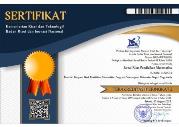PENGEMBANGAN PERANGKAT PEMBELAJARAN TEOREMA PYTHAGORAS DENGAN MEDIA BERBANTUAN KOMPUTER
Djamilah Bondan Widjajanti, Universitas Negeri Yogyakarta, Indonesia
Abstract
Kata kunci: pengembangan, silabus, RPP, LKS, media, prestasi belajar siswa, mathematics self-efficacy.
Full Text:
PDFReferences
Anjum, R. (2006). The impact of self-efficacy on mathematics achievement of primary school children. Pakistan Journal of Psychological Reasearch: Winter, 21, ¾; ProQuest Research Library.
Bandura, A. (1995). Exercise of personal and collective efficacy in changing societies. In A. Bandura (Ed.), Self-efficacy in changing societies. New York: Cambridge University Press.
Bandura, A. (1977). Self-efficacy: Toward a unifiying theory of behavioral change. Psychological Review. Vol. 34, No. 2, 191-215. Error! Hyperlink reference not valid..
Crawford, M. L. (2001). Teaching contextually: Research, rationale, and techniques for improving student motivation and achievement in mathematics and science. Waco, Texas: CCI Publishing, Inc.
Johnson, E. B. (2010). CTL Contextual teaching learning: Menjadikan kegiat-an belajarmengajar mengasyikkan dan bermakna. Cetakan Pertama. (Ter-jemahan Ibnu Setiawan). Bandung: Kaifa. (Buku asli diterbitkan tahun 2009).
Liu, X., & Koirala, H. (2009). The effect of mathematics self-efficacy on mathematics achievement of high school students. In: Proceeding of the NERA (Northeastern Educational Research Association) Conference 2009. Tersedia di Error! Hyperlink reference not valid. diakses tanggal 29 Mei 2013).
Masnur Muslich. (2008). KTSP pembelajaran berbasis kompetensi dan kontekstual: Panduan bagi guru, kepala sekolah, dan pengawas sekolah. Cetakan ke-4. Jakarta: Bumi Aksara.
Moore, K. D. (2009). Effective instructional strategies: from theory to practice. London: Sage Publication, Inc.
Ormrod, J. E. (2003). Educational psychology: Developing learners. (4th ed.). Upper Saddle River,NJ: Merril Prentice Hall.
Sengul, S. (2011). Effects of concept cartoons on mathematics self-efficacy of 7th grade students. Educational Sciences: Theory & Practice-11(4). Auntumnpage 2305-2313.
Skemp, R. R. (1971). The psychology of learning mathematics. Victoria,
Australia: Penguin Books Ltd.
Souders, J. (1999). Contextually based learning: Fad or proven practice. American Youth Policy Forum. Washington, D. C. Diungguh dari http://www.aypf.org/forumbriefs/1999/t b070999.htm. Diungguh tanggal 20 Mei 2013.
Sunnetha, E., Sambasiva Rao, R., & Bhaskara Rao, D. (2011). Methods of teaching mathematics. New Delhi: Discovery Publishing House.
Tait, S. L. (2008). Self-efficacy in mathematics: Affective, cognitive, and conative domains of functioning. Proceedings of the 31st Annual Conference of the Mathematics Education Research Group of Australasia. Merga Inc.
Tamuri, H. (2005). Permasalahan pelajar-pelajar fakir miskin di daerah Sabak Bernam. Jurnal Pendidikan, Vol 30. 21-33.
Thiagarajan, S., Semmel, D. S., & Semmel, M. I. (1974). Instructional development for training teachers of exceptional children, a source book. Blomington, Indiana: Indiana University.
Margolis, H., & McCabe, P. P. (2006). Improving self-efficacy and motivation: What to do, what to say. Intervention in School and Clinic. 41, 4; ProQuest. pg. 218-227.
Zimmermann, M., Bescherer, C., & Spannagel, C. (2011). A questionaire for surveying mathematics self-efficacy expectations of future teachers. Article of German Federal Ministry of Education and Research.
DOI: https://doi.org/10.21831/jrpm.v1i2.2677
Refbacks
- There are currently no refbacks.
Copyright (c)
Jurnal Riset Pendidikan Matematika indexed by:

Jurnal Riset Pendidikan Matematika by http://journal.uny.ac.id/index.php/jrpm/index is licensed under a Creative Commons Attribution-ShareAlike 4.0 International License.
All rights reserved. p-ISSN 2356-2684 | e-ISSN 2477-1503
View My Stats















